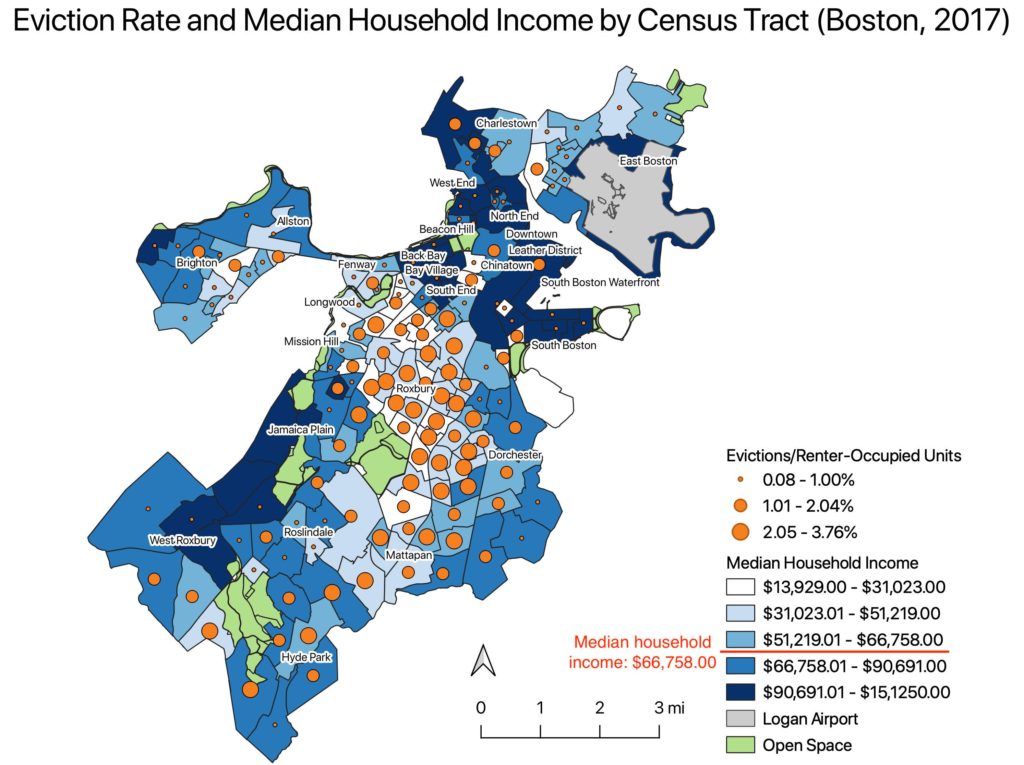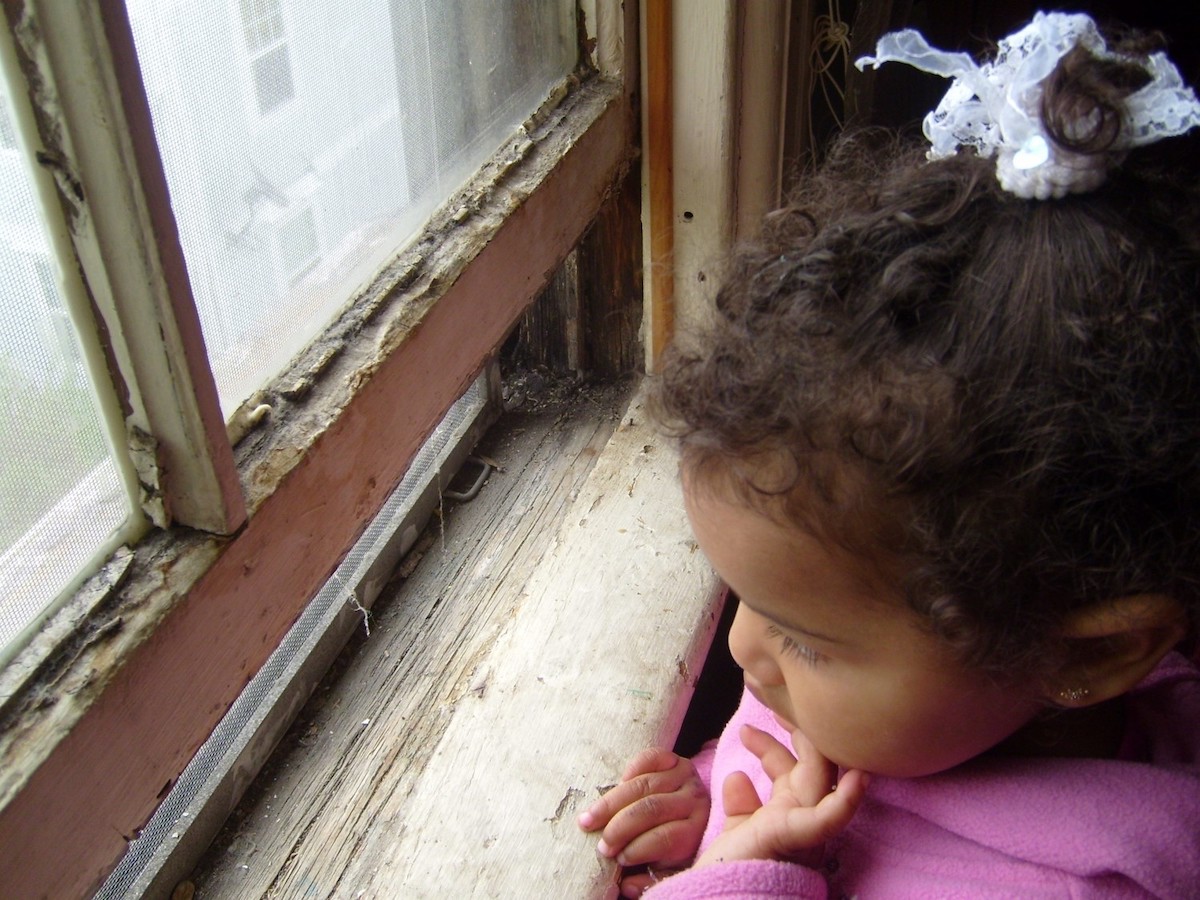Housing evictions are a core public health challenge in Massachusetts, and efforts to reduce the spread of Covid-19 will likely create an eviction crisis extending far into the future. We analyzed 2017 data derived from housing court files collected by not-for-profit organizations to identify some key predictors of eviction in Massachusetts. These data contain information on all 5,033 eviction cases filed in the Eastern Housing Court in 2017 which includes all of Boston, the remainder of Suffolk County, and nearby municipalities.
Of the 5,033 eviction cases, 75 percent cited non-payment of rent and 45 percent ended in eviction. Eviction rates were highest in low-income areas. The average amount of back rent due ranged from $962-$3,586. The Covid-19 emergency will exacerbate an already high eviction rate.

Map by Andrea Dettorre, MPH based on original research conducted for this project in 2019.
In accordance with emergency orders, Massachusetts Housing Courts have suspended non-emergency residential evictions from March 17 until at least May 4. Tenant advocacy groups have proposed emergency legislation to place a moratorium on evictions during the emergency. Nationwide, the CARES Act instituted on March 27 prevents evictions by landlords with federally-funded mortgages for 120 days. However, tenants must continue paying rent. Mean monthly rent for a two-bedroom apartment in the least expensive Boston neighborhoods is $2,000 or 50 percent of the monthly income of two individuals working minimum wage jobs. As a result of the emergency orders, many people cannot work, including a large percentage of the more than 200,000 service industry workers in Boston. These workers will accrue thousands of dollars of back rent, putting them at risk for eviction.

During a housing inspection in Massachusetts, a young girl sits at a window that is covered in flaking lead paint. This is an example of a type of housing condition that a tenant may live with for a long period of time until an eviction case is brought against them.
Despite the suspension, landlords continue to file eviction cases against tenants. In the two weeks between the Governor’s Emergency Declaration on March 10 and March 24, 95 cases were filed within the Eastern Housing Court and 383 across Massachusetts. On March 25, $5 million was added to the Residential Assistance for Families in Transition (RAFT), an existing program that provides one-time funds to help pay back rent to tenants at risk of eviction. These additional funds are projected to serve approximately 1,668 Massachusetts households impacted by Covid-19 but will not keep pace with the emergency. In addition, $3 million of city funds were used to create the Rental Relief Fund for Boston residents impacted by Covid-19.
Tenants facing eviction will lose vital legal protections during the emergency. The single best protection against eviction is to file counterclaims, legal claims against the landlord. Our research shows that tenants who file counterclaims have a 30 percent lower risk of eviction. Counterclaims are based on housing conditions deemed to impair or endanger the health or safety of occupants, such as inadequate heat or a pest infestation. Boston’s Inspectional Services Department (ISD) is often called to determine substandard housing conditions, and their findings are used as evidence to support counterclaims. ISD has currently stopped all non-emergency inspections and court Housing Specialists have stopped site visits, meaning tenants will lack proof of counterclaims once courts reopen. Tenants often do not call for an inspection even on persistent or hazardous conditions until an eviction case is filed against them, and most tenants will be unable to access the basic inspectional services to prove valid claims and protect their legal rights during this crisis.
The Covid-19 emergency will exacerbate an already high eviction rate.
Another protection for tenants facing eviction is representation by an attorney. Tenants with representation are five times more likely to file counterclaims and 62 percent less likely to be evicted. Prior to Covid-19, fewer than 15 percent of all tenants facing eviction cases in Boston had an attorney. Once courts reopen, this number could be much lower. Many of Boston’s legal aid organizations rely on law students to provide free representation to tenants. Uncertainty around the reopening of campuses may limit the number of students working in legal aid for the summer and reduce availability of representation during a predicted rise of eviction cases. The proportion of cases ending in evictions will likely be greater than the 45 percent before the Covid-19 pandemic.
The Covid-19 crisis is simultaneously undermining the existing public health and legal protections tenants have against evictions. When courts reopen, tenants facing eviction must have a safety net. It is unclear whether landlords will demonstrate leniency, or exactly how courts will handle a backlog of cases. Housing courts have indicated that they will encourage landlords and tenants to come to agreements outside of court. Without representation, many tenants are likely to agree to unfavorable terms that will increase their risk of eviction now and into the future. When courts reopen, tenants facing eviction must have a safety net.
Photo by Lance Anderson on Unsplash

















